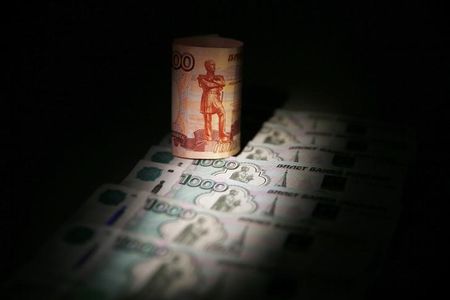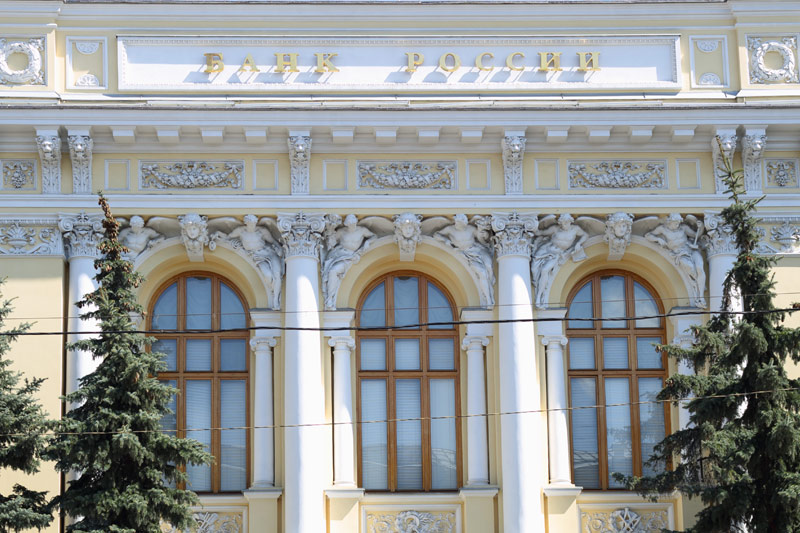By Elena Fabrichnaya, Jason Bush and Lidia Kelly
MOSCOW (Reuters) - Russia faces the prospect of three more years of sanctions and stagnation, the central bank said on Monday, honing its tactics to defend the rouble from the fallout of President Vladimir Putin's Ukraine policies and dependence on oil revenue.
In its annual monetary policy strategy document, the bank's base scenario expected just 0.3 percent economic growth in 2014, zero growth in 2015, and 0.1 percent growth in 2016, with only a modest revival, to 1.6 percent, in 2017. It had earlier forecast 0.4 percent this year, 1 percent next year and 1.9 in 2016.
The bank also predicted net private sector capital outflows would now reach $128 billion (80.64 billion pounds) in 2014 and $99 billion in 2015, up sharply from its previous forecasts of $90 billion and $35 billion respectively.
Separately, it scrapped the rouble's corridor against a dollar-euro basket, formalising a decision effectively made last week when it announced limits to intervention after spending $70 billion to prop up the currency this year.
The rouble has lost almost a quarter of its value since the middle of the year when Putin's backing for separatists in Ukraine sent East-West relations to a post Cold War low.
On Monday it was up around 2 percent after the central bank said it would replace daily intervention with purchases at any time to punish speculators and temporary restrictions on rouble liquidity to prevent market "games".
The central bank said its base forecasts anticipated Western sanctions imposed over Ukraine lasting at least until the end of 2017. The first official assessment of their duration, its view tallied with that expressed by influential former finance minister Alexei Kudrin in September.
Its forecast also assumed a modest recovery in the oil price to $95 per barrel next year, followed by a further decline, a scenario some analysts thought could be too rosy.
"Oil at 95 (dollars) may be optimistic, but the assumption of sanctions staying until 2017 seems very realistic and suggests Russia is planning for the long haul," Standard Bank analyst Tim Ash said in a note.
MISERABLE OUTLOOK
Sanctions imposed by the United States and European Union against major Russian banks and companies over Moscow's role in Ukraine have led to a virtual freeze on investment inflows that has contributed to the rouble's slide.
The falls have been amplified by growing demand for foreign currency from Russians fearful about the value of their savings, but there is little to suggest the economic woes are creating political difficulties for Putin.
On Monday he said there was no fundamental economic reason for the rouble's slide; Finance Minister Anton Siluanov also weighed in, saying it was clearly undervalued and he hoped its volatility would cease by the end of the year.
Putin's public approval rating is at a record high of 88 percent according to the Levada Centre polling agency, boosted this year by patriotic support for his policies in Ukraine, notably the annexation of Crimea in March.
"The public mood (is) that these economic hardships are the fault of the foreign enemies of Russia," said Christopher Granville, managing director of Trusted Sources, an emerging markets consultancy in London.
FAILED GROWTH MODEL
There has also been no sign that economic difficulties have encouraged Putin to shift policy on Ukraine; fighting has worsened in the past week in the east, tearing apart a ceasefire deal between pro-Russian separatists and government forces.
Even before the escalation of the Ukraine crisis this year, the economy was performing poorly, with disappointing growth of 1.3 percent in 2013, underscoring how a growth model based largely on energy exports is no longer working.
In its base scenario, the bank predicted that the Urals oil price would recover in the short term to average $95 per barrel in 2015, but fall to $90 per barrel by the end of 2017.
The bank also considered alternative scenarios, including the possibility that sanctions would be lifted in the third quarter of 2015, as well as the possibility that oil prices would recover to over $100 per barrel.
If the sanctions are lifted next year, the bank predicted 0.3 percent economic growth in 2015 with oil at $95 per barrel, and 0.6 percent growth if the oil price recovers to $105.
The bank also considered more pessimistic scenarios with lower oil prices. In its worst-case "stress scenario", in which the oil price fell to $60 by the end of 2015, the economy would shrink by 3.5-4 percent in 2015.
"In working out its scenarios the Bank of Russia considered tendencies in the Russian economy in recent years, which show that existing structural constraints won't be overcome quickly," the bank said in its report.
"As a result even with a more favourable combination of external factors moderate economic growth rates are forecast."

(Reporting by Elena Fabrichnaya, Jason Bush, Alexander Winning and Lidia Kelly, writing by Jason Bush, editing by Philippa Fletcher)
